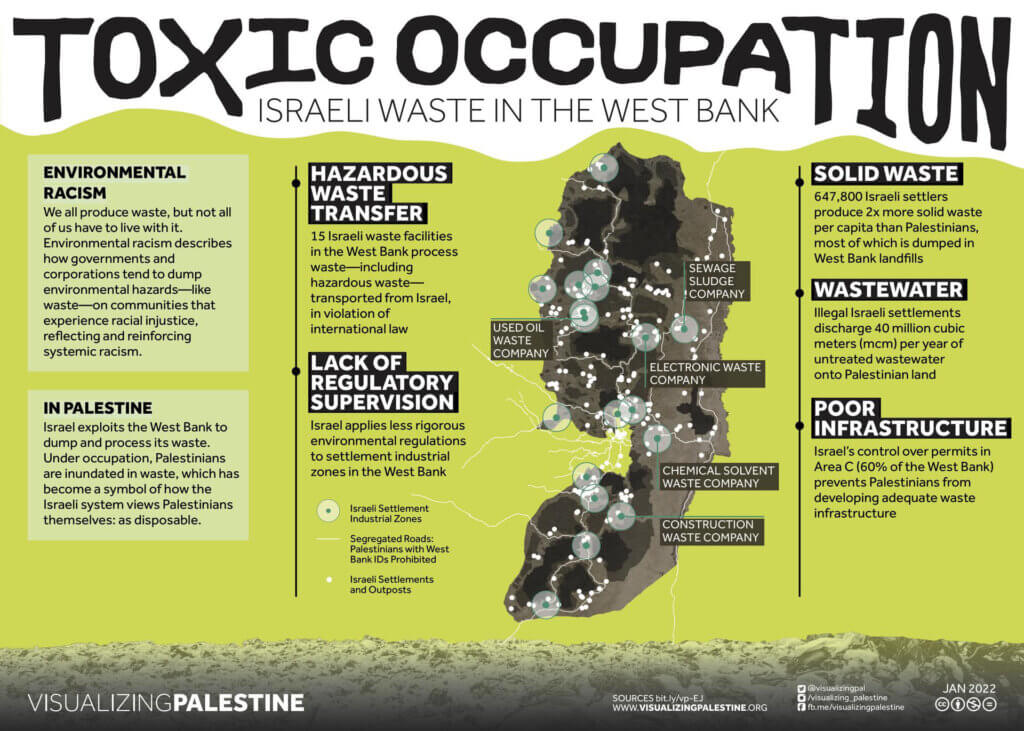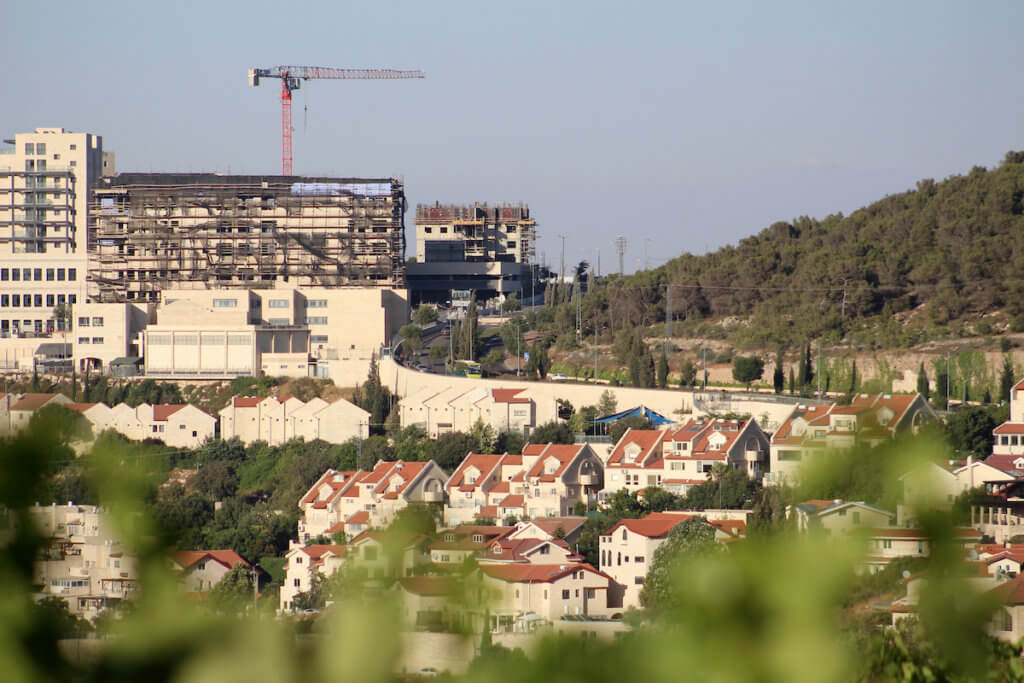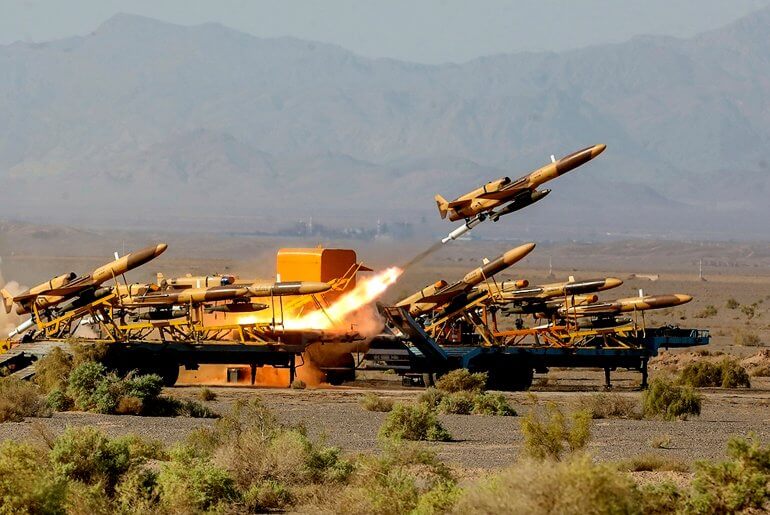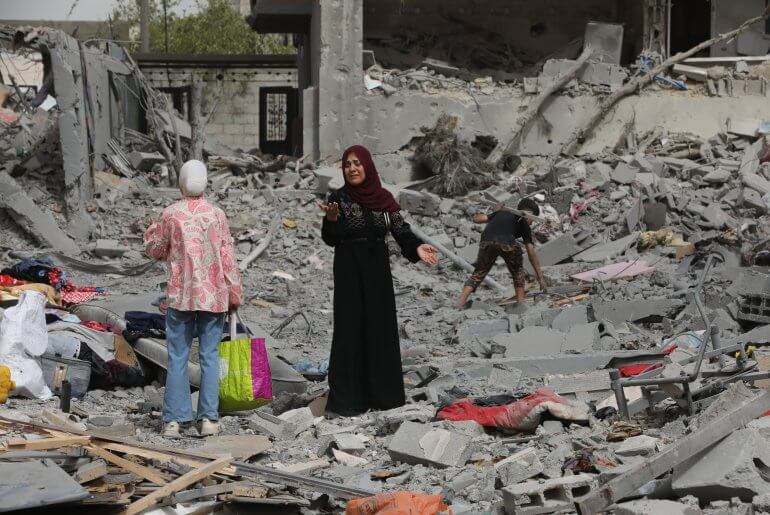
Ever since its genocidal birth in 1948, Israel has used settler-colonial expansion—and the urbanization of native Palestinian lands—to devastate both the indigenous Palestinian people and the natural, non-human environment. While the intense global concern about climate change is rarely applied to Israel’s catastrophic policies and practices, the inherent and inescapable illegalities of Israeli settlements, coupled with their disastrous effects on Palestinian life and natural resources, have formed the crux of the Palestinians’ rejection thereof.
Israeli settlements embody urbanization and the immense harm it poses. First, Israeli settlements are almost entirely built on confiscated Palestinian agricultural or grazing lands and are only erected after clear-cutting and uprooting local flora, namely olive trees: a primary source of food and income for Palestinians. The olive tree is also and an integral element of Palestinian identity, dating back millennia and symbolizing peace, steadfastness, fortitude, and resilience. As of 2015, the olive sub-sector constituted 15% of Palestine’s total agricultural income, supported over 100,000 Palestinian families, and provided “3 to 4 million days of seasonal employment per year”. Not only are Palestinian olive trees clear-cut to construct Israel’s illegal settlements, but according to the United Nations, are also “subject to fire, uprooting and vandalism by settlers”. Conservative estimates taken in 2011—after which Israel has only intensified its colonial efforts—revealed that nearly 1 million Palestinian olive trees have been uprooted and destroyed in a settler-colonial attempt to erase all traces of Palestinian heritage, culture, and existence.
According to a 2020 United Nations Environment Programme (UNEP) report, the destruction of Palestinian olive trees — a cog in the greater, well-oiled Israeli mechanism of ethnic cleansing — coupled with the strategic expansion of illegal Israeli settlements, has devastated terrestrial ecosystems, causing severe “habitat fragmentation, desertification, land degradations, rapid urbanization, and soil erosion”. The UNEP went on to state that the process of urbanization through the “removal of rocks for construction, the uprooting of trees, invasive species [most often imported by the Israeli government and settlers to ‘Europeanize’ the land], [and] pollution…[is] threatening habitats and species.” The cruel, discriminatory measures Israel imposes upon Palestinians has led, among other issues, to a drastic decrease in agricultural productivity—and hence economic growth and stability—across Palestine.
The effect of urbanization on local fauna is equally frightening. The previously diverse Palestinian fauna is under imminent threat. Israel’s construction of roads, the methods used to do so, and a sheer disregard for their ecological ramifications all threaten and harm Palestinian wildlife. Israeli forces often drill deep into mountains—inhabited by a wide range of natural fauna—thereby both displacing local wildlife populations, inhibiting their natural migrations, and resulting in a spike in animal deaths through roadkill. Furthermore, the destruction of the animals’ natural habitat—particularly their breeding and nesting sites—through “extensive land leveling and the fencing-off of settlement perimeters” has disrupted natural passageways, endangered many species, and caused severe imbalances in their population number and reproduction rates, affecting the food chain and local ecosystem as a whole.
Yet another area where the damaging effects of urbanization can be observed is the exploitation, overuse, misuse, mismanagement, and contamination of Palestinian natural resources. Israeli settler communities confiscate and maintain a policy of domination over Palestinian water sources. According to a 2012 report issued by the French Parliament’s Foreign Affairs Committee, “Some 450,000 Israeli settlers on the West Bank use more water than the 2.3 million Palestinians that live there. In times of drought, in contravention of international law, the settlers get priority for water”. Moreover, B’Tselem—Israel’s largest and most well respected human rights group—stated that while Israelis consume a whopping “242 liters of water per person every day…Palestinians consume…as little as 20 liters per day in some areas”. This, of course, is “dramatically less than the 100 liters that the World Health Organisation recommends as the minimum quantity for basic [water] consumption”.

Urbanization is also known to result in waste management and disposal issues, which can have horrifying effects. Israel dumps 80% of the waste products generated from Israeli settlements in the occupied West Bank. This in turn, “[pollutes] the Palestinian earth and water supply, while Israeli settlers in the West Bank – who produce similar amounts of wastewater to the Palestinian population, despite being outnumbered more than six to one – deliberately poison the water, land and livestock of nearby Palestinian villages”. This means that every year over “2 million cubic metres of raw [untreated] sewage flow into the valleys of streams of the [Palestinian] West Bank…[causing] severe damage through the West Bank…[and] the contamination of mountain groundwater” which is widely considered the greatest source of water in the region. Unsurprisingly, this gargantuan dumping of Israeli waste into Palestinian lands contaminates water supplies, rendering them unsuitable for human consumption and crop cultivation. Additionally, in an intensely disturbing manifestation of its racist, Jewish-supremacist, apartheid policies, Israel transferred a number of polluting factories where “solid waste…is burned in open air” producing “carcinogenic chemical emissions” into the Palestinian West Bank, in order to protect the Israeli public.
Urbanization—particularly when implemented in the process of settler-colonization—is devastating to the environment, and perhaps more importantly, to the lives of the indigenous people who ever so affectionately call the land home. The burden of the earth’s protection lies upon the shoulders of these individuals, and the bodies erected to represent their interests. It is our duty to hold the perpetrators of such environmental and humanitarian crimes accountable and ensure that future generations see a free and vibrant green planet, not one drowning in the menacing, ominous grays of settler-colonial urban civilization.
Zubayr Alikhan
Zubayr Alikhan is a student, activist, and writer whose primary focus is on the pursuit of justice with a particular emphasis on international human rights, anti-colonial resistance, and legal accountability. He writes on issues highlighting oppression and tyranny around the world.




https://www.timesofisrael.com/a-deadly-trash-trade-is-poisoning-palestinians-in-the-west-bank/
A deadly trash trade is poisoning Palestinians in the West Bank…Burning Israeli scrap for valuable raw metals is a lethal livelihood for thousands of Palestinians, sending cancer rates skyrocketing in villages near Hebron…Israel generates about 130,000 tons of electronic scrap per year, according to official estimates. Much of it is smuggled into the West Bank, where it is resold or stripped by Palestinians seeking the valuable raw metals within….“We see this phenomenon all over the world, but Israel’s ‘Third World’ is just 10 to 15 minutes’ drive away from central Israel,” said Garb, a professor at Ben-Gurion University who has spent years studying the industry and its impact….Both Israeli and Palestinian law bars the transfer of Israeli waste to the West Bank, but the shipments continue apace. Some Israeli companies and individuals save thousands of shekels, or even turn a profit, by sending their waste to smugglers, who sell it to Palestinian scrapyards.